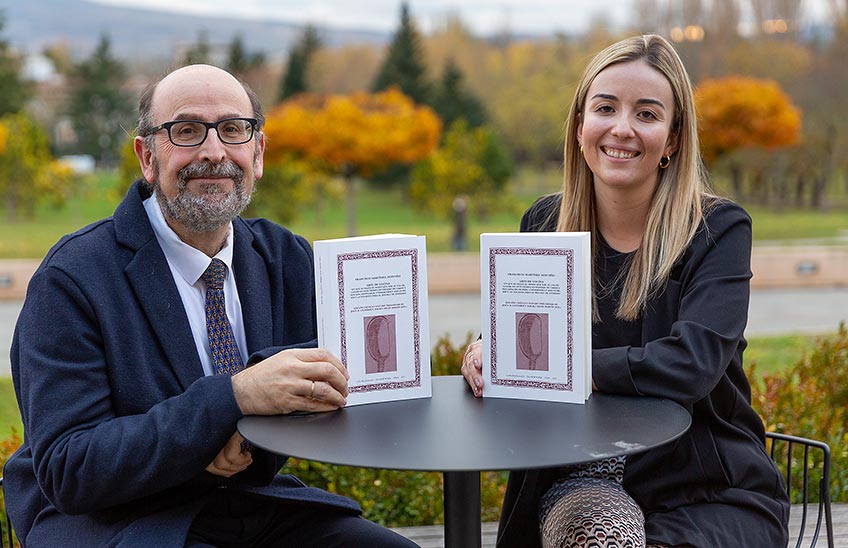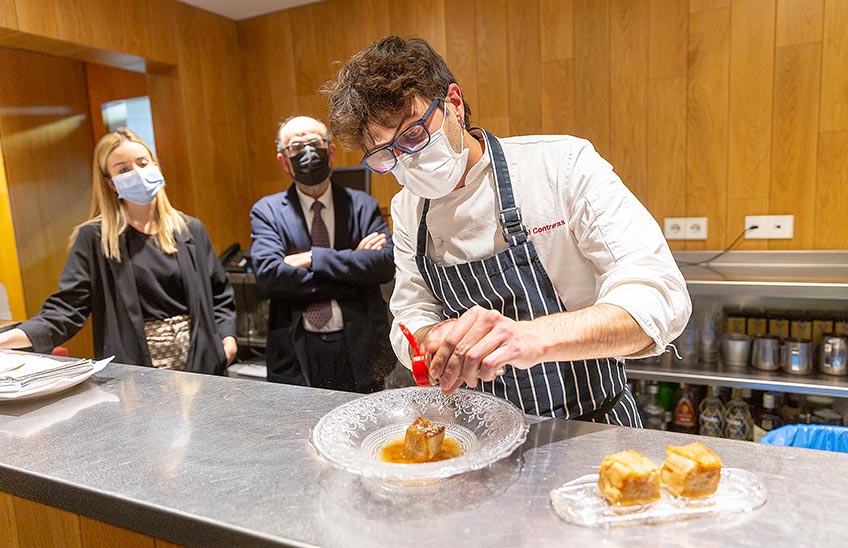The University rescues the recipes of the cook of King Philip III
The School of Philosophy y Letras presents the critical edition of a 17th century recipe book in an event that included a showcooking by chef Pol Contreras.

PhotoManuelCastells/Authors of the book Jesús M. Usunáriz and Magalí Ortiz
17 | 11 | 2021
In 1611, Francisco Martínez Montiño, chief cook to King Philip III, wrote the recipe book Arte de cocina, pastelería, bizcochería y conservería, a work with more than half a thousand recipes and culinary tricks. Such was its success that it was reprinted 25 times between the 17th and 19th centuries. Four hundred years after its publication, the group of research Siglo de Oro (GRISO) of the University of Navarra has launched a critical edition of the book, by the hand of high school of programs of study Auriseculares (Batihoja Collection, New York, 2021).
The authors, Jesús M. Usunáriz, Full Professor of Modern History at School of Philosophy and Letters, and Magalí Ortiz, a graduate in History and Journalism from the University of Navarra and an expert in the history of gastronomy, presented the work at an event held in the restaurant of the Museum of the academic center. The event, moderated by Carlos Mata, secretary of GRISO, was also attended by chef Pol Contreras, in charge of the creative workshop at Echaurren in Ezcaray, who prepared three of Montiño's recipes.

Chef Pol Contreras preparing one of the recipes included in the book.
As Usunáriz explained, the book is aimed at both cooking professionals and a wide public interested in gastronomy. In a clear and simple way, it explains how to prepare very diverse dishes, "from the most traditional, such as bean stew, borage soup or buñuelos de viento, to the most innovative and sophisticated, such as wild boar head cheese, wood pigeons with almond sauce or Savoy cakes".
The critical edition also has a glossary that analyzes terms, techniques and ingredients of the time: "With this book we can better understand the culture of the Golden Age, identify some codes that are unknown to us, and get closer to the men and women of the sixteenth and seventeenth centuries through their gastronomy, because cooking is also culture". In this sense, he shared with the audience some curiosities of the time, such as the dishes that were prepared for certain patients, the tastes of King Philip III, or terms such as Days of fish, which Montiño quotation in his book: "Many are unaware that almost 150 days a year were fasting and abstinence and so it was contemplated in the calendar of the time".
Gastronomic experience, yesterday and today
During the colloquium, reference was made to current concepts such as "Gastronomic Experience", which were also present centuries ago. In her speech, Magalí Ortiz said that the edition of the book coincided with an internship she did at group IXO, which allowed her to identify similar parameters in both periods: "I realized that, despite the time difference, today's gastronomic experience is similar to what was in style at the court in the Golden Age. There are many parallels, from the importance of aspects such as cleanliness in the kitchen, or the service, to the experiential environment surrounding the food".
Pol Contreras agreed that "the way of eating in the 16th and 17th centuries has not changed much with respect to the 21st century. It is surprising how something that we can think of as modern has already been contemplated centuries ago". Likewise, the winner of award Revelación a Mejor Pastelero de Restaurante 2019 Madrid Fusión and finalist of The Best Dessert 2014 in Mesamérica (México D.F), has assured that "to develop an avant-garde cuisine, you have to look back".
The work can be found available in open access for its enquiry and download in PDF in DADUN, the archive of the University of Navarra. It can be accessed from the following link.
Jesús M. Usunáriz is Full Professor of Modern History of the School of Philosophy and Letters of the University of Navarra and member of GRISO. His programs of study has focused on the International Office of the Hispanic Monarchy and on the social and cultural history of the 16th-18th centuries. Among other publications, he is the author of España en Alemania: la Guerra de los Treinta Años en las crónicas y relaciones de sucesos (2016), or the Diccionario de injurias de los siglos XVI y XVII (2019), written with Cristina Tabernero. He is director of the journal report y Civilización and of the collection Library Services Áurea Digital (BIADIG) of the GRISO.
Magalí Ortiz Martín has a degree in History and Journalism from the University of Navarra. She has worked at elBulliFoundation, where she has participated in projects such as elBulliLab (2016) or elBulli1846 (2021), both related to the History of Gastronomy and creativity. She has also collaborated with the department of Communication of group of IXO restaurants, among which are Mugaritz and Nerua and with that of the Six Senses hotel chain in Portugal.
Pol Contreras is in charge of the creative workshop at Echaurren in Ezcaray. His first steps in catering were at the age of 15 and since then he has trained as a pastry chef and cook in restaurants and pastry shops in different European countries. He has been winner of the Revelation award for Best Restaurant Pastry Chef 2019 Madrid Fusion and finalist of The Best Dessert 2014 in Mesamérica (Mexico City). He has his own brand of chocolates, "Chocolates Pol Contreras" and has developed a new chocolate with pulp and seedless of the cocoa fruit. He also has a podcast on Youtube, "Oído", in which he talks to personalities from the world of gastronomy.
